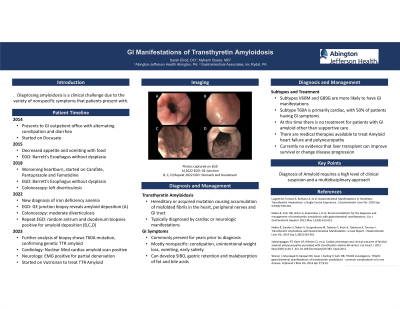Monday Poster Session
Category: Small Intestine
P2663 - GI Manifestations of Transthyretin Amyloidosis
Monday, October 23, 2023
10:30 AM - 4:15 PM PT
Location: Exhibit Hall

Has Audio

Sarah Elrod, DO
Jefferson Abington Hospital
Abington, PA
Presenting Author(s)
Sarah Elrod, DO1, Shravya Ginnaram, MD1, Kyle Marrache, DO1, Myhanh Bosse, MD2
1Jefferson Abington Hospital, Abington, PA; 2Gastrointestinal Associates, Inc., Abington, PA
Introduction: Transthyretin (TTR) amyloidosis is a rare disease typically diagnosed by cardiology or neurology. However, upwards of 80% of these patients initially present with gastrointestinal symptoms and go years before a diagnosis. This case follows a patient over the course of 8 years prior to her diagnosis of TTR amyloid.
Case Description/Methods: This 60-year-old patient presented to the gastroenterology office with constipation and alternating diarrhea. Her constipation was managed with docusate but over the next few years developed a decreased appetite and vomiting. Diagnostic endoscopy and colonoscopy revealed Barrett’s esophagus without dysplasia which was repeated two years later when she developed new iron deficiency anemia. On this EGD, biopsies showed concern for amyloid deposition at the GE junction. The study was repeated, and new biopsies from the stomach and small intestine were positive for transthyretin amyloid with a T60A mutation. Further testing revealed a positive NM Cardiac amyloid scan and EMG positive for partial denervation.
Discussion:
Transthyretin amyloidosis is a hereditary or acquired mutation causing secretion of misfolded fibrils by the liver that accumulate in the heart, peripheral nerves and GI tract. Many patients are initially diagnosed with peripheral neuropathy or heart failure, however gastrointestinal symptoms are frequently present for years prior to this. It is unclear what causes the gastrointestinal symptoms, the two main hypotheses being decreased motility from autonomic neuropathy and deposits causing decreased intestinal endocrine cells and cells of Cajal.
60-80% of patients diagnosed with TTR amyloid have gastrointestinal manifestations though the extent depends on the mutation type, including V30M, G89G and T60A. Almost all patients with V60M have GI manifestations, while G89G typically only have GI manifestations and T60A is mostly cardiac disease with about half having GI symptoms. Many of these symptoms are nonspecific with most patients presenting with constipation, unintentional weight loss, vomiting, and early satiety. Many patients will also develop small intestine bacterial overgrowth, gastric retention and malabsorption of fat and bile acids. The presence of GI symptoms has a large impact on the nutritional status and quality of life in these patients.
The few studies that have looked at the effect of liver transplant have shown no improvement in survival or change in disease progression.
Disclosures:
Sarah Elrod, DO1, Shravya Ginnaram, MD1, Kyle Marrache, DO1, Myhanh Bosse, MD2. P2663 - GI Manifestations of Transthyretin Amyloidosis, ACG 2023 Annual Scientific Meeting Abstracts. Vancouver, BC, Canada: American College of Gastroenterology.
1Jefferson Abington Hospital, Abington, PA; 2Gastrointestinal Associates, Inc., Abington, PA
Introduction: Transthyretin (TTR) amyloidosis is a rare disease typically diagnosed by cardiology or neurology. However, upwards of 80% of these patients initially present with gastrointestinal symptoms and go years before a diagnosis. This case follows a patient over the course of 8 years prior to her diagnosis of TTR amyloid.
Case Description/Methods: This 60-year-old patient presented to the gastroenterology office with constipation and alternating diarrhea. Her constipation was managed with docusate but over the next few years developed a decreased appetite and vomiting. Diagnostic endoscopy and colonoscopy revealed Barrett’s esophagus without dysplasia which was repeated two years later when she developed new iron deficiency anemia. On this EGD, biopsies showed concern for amyloid deposition at the GE junction. The study was repeated, and new biopsies from the stomach and small intestine were positive for transthyretin amyloid with a T60A mutation. Further testing revealed a positive NM Cardiac amyloid scan and EMG positive for partial denervation.
Discussion:
Transthyretin amyloidosis is a hereditary or acquired mutation causing secretion of misfolded fibrils by the liver that accumulate in the heart, peripheral nerves and GI tract. Many patients are initially diagnosed with peripheral neuropathy or heart failure, however gastrointestinal symptoms are frequently present for years prior to this. It is unclear what causes the gastrointestinal symptoms, the two main hypotheses being decreased motility from autonomic neuropathy and deposits causing decreased intestinal endocrine cells and cells of Cajal.
60-80% of patients diagnosed with TTR amyloid have gastrointestinal manifestations though the extent depends on the mutation type, including V30M, G89G and T60A. Almost all patients with V60M have GI manifestations, while G89G typically only have GI manifestations and T60A is mostly cardiac disease with about half having GI symptoms. Many of these symptoms are nonspecific with most patients presenting with constipation, unintentional weight loss, vomiting, and early satiety. Many patients will also develop small intestine bacterial overgrowth, gastric retention and malabsorption of fat and bile acids. The presence of GI symptoms has a large impact on the nutritional status and quality of life in these patients.
The few studies that have looked at the effect of liver transplant have shown no improvement in survival or change in disease progression.
Disclosures:
Sarah Elrod indicated no relevant financial relationships.
Shravya Ginnaram indicated no relevant financial relationships.
Kyle Marrache indicated no relevant financial relationships.
Myhanh Bosse indicated no relevant financial relationships.
Sarah Elrod, DO1, Shravya Ginnaram, MD1, Kyle Marrache, DO1, Myhanh Bosse, MD2. P2663 - GI Manifestations of Transthyretin Amyloidosis, ACG 2023 Annual Scientific Meeting Abstracts. Vancouver, BC, Canada: American College of Gastroenterology.

